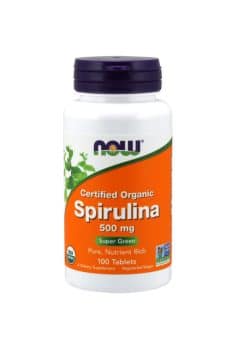Blue Spirulina is an elite superfood that is loaded with beneficial antioxidants and nutrients.
Spirulina is a type of blue-green algae that belongs to the phylum cyanobacteria. It has a cylindrical, spiral-like shape, which is from where Spirulina gets its name. The basic form of Spirulina is green in colour. The algae is harvested, dried and ground into the blue-green Spirulina powder we are familiar with.
Blue Spirulina is a special extract of regular Spirulina
To make Blue Spirulina powder, phycocyanin is extracted from the algae. Therefore, it is essentially phycocyanin in its purest form. This explains why it has a stunning bright blue colour, rather than being green like regular Spirulina. This also makes Blue Spirulina a delightfully colourful natural ingredient that can brighten up your foods and recipes. In addition, it provides a highly concentrated dose of antioxidants.

Blue Spirulina is classified as a superfood because it is a nutritional powerhouse. Indeed, the World Health Organization (WHO) has supported its use to treat malnutrition. NASA also credits Blue Spirulina for its incredible nutritional density:
Just one gram of this superfood has the antioxidant and micronutrient equivalent of approximately one kilogram of fruits and vegetables!
Blue spirulina is associated with several potential health benefits, which are outlined below:-
Digestive Health
Gut health plays a very important role in contributing to our immune function. Spirulina has been shown to enhance the composition of gut bacteria as well as the function of the cells making up the intestinal lining. This could help relieve digestive issues including bloating, constipation, and diarrhea.
Potent Anti-inflammatory and Antioxidant
Chronic inflammation and oxidative damage are associated with many diseases and health conditions. These include arthritis, cardiovascular disease, diabetes, obesity and even cancer. Consuming wholesome foods that counteract these conditions may help prevent the development or progression of these diseases.
Blue Spirulina contains chlorophyll as well as very high concentrations of the powerful antioxidant phycocyanin. These two supplements have been shown to have powerful anti-inflammatory and antioxidant effects.
Disease and infection prevention
It has been established that the phycocyanin constituting Blue Spirulina may help fight infection. Firsly, it may counteract specific types of cancer cells, such as those found in the breast and the prostate. Secondly, the immune-boosting benefits of Blue Spirulina contributes to the prevention and treatment of other illnesses.
May lower LDL and triglycerides
One of the major risk factors for heart disease (the number one cause of death) is high LDL (aka bad cholesterol) levels, and low HDL (aka good cholesterol) levels. Spirulina can help lower total cholesterol, LDL cholesterol, and triglycerides while increasing HDL levels.
Blue Spirulina also helps combat atherosclerosis by reducing oxidative stress and inflammatory markers as outlined above.
Weight loss aid
Spirulina is a popular superfood to support weight loss. Admittedly it is not entirely clear how Spirulina helps achieve weight loss, although one factor that may explain this weight loss effect is the very high fibre and protein content.
Firstly, fibre can help you feel full for longer periods of time, making it easier to control energy intake. Therefore, allowing you to sustain a calorie deficit to achieve one’s desired weight and fat loss goals. Secondly, Spirulina is very high in protein, which supports lean muscle retention during fat loss and increases satiety.
Potential anti-carcinogenic
Early studies have shown that Spirulina may help prevent and fight cancer, particularly when used alongside conventional medical treatments. Many believe that this is due to its ability to protect tissues from oxidative damage while simultaneously promoting the regeneration of new, healthy cells.
May regulate blood pressure
High blood pressure is a major risk factor for many diseases and health conditions, in particular cardiovascular disease and stroke. Some studies suggest that Spirulina may be able to naturally lower blood pressure by enhancing blood circulation and reducing inflammation. Increased nitric oxide production may also help reduce blood pressure by widening blood vessels and improving overall heart function.
May help with allergies
Allergic rhinitis – aka hay fever – is a common condition in Malta, particularly during spring! This can lead to several annoying symptoms, including sneezing and sniffling. Some studies suggest that Blue Spirulina may be able to reduce the severity of these symptoms because of its potent anti-inflammatory effects. This superfood may be particularly beneficial for people who suffer from allergic reactions due to pollen exposure.
Muscle endurance and strength
Oxidative damage induced by exercise is a major contributor to muscle fatigue. Blue Spirulina may be able to protect against this damage through its powerful antioxidant properties, while improving endurance and strength. By decreasing the amount of free radicals in your system, Blue Spirulina can also reduce muscle soreness after exercise.
May boost eye health
Sight is one of the most important senses and an important aspect of one’s overall health. It is very typical for people to experience vision problems as they get older. Blue Spirulina may help prevent these problems by protecting against oxidative stress and decreasing inflammation. Thereby, preventing damaging effects on your eyes.
May alleviate anemia
The most common form of anemia tends to arise as a result of an iron deficiency. Spirulina is also rich in iron, which your body needs and uses to produce haemoglobin and red blood cells. Consuming Blue Spirulina as a superfood supplement may be effective in treating anemia by increasing the amount of non-heme iron in your diet. However, this should compliment, not substitute, any anemia medications or iron supplements which your physician subscribed.
Energy boost
Many factors contribute to fatigue, including anemia, poor diet, poor sleep, stress and an under-active thyroid. Blue Spirulina appears to have anti-fatigue and energy boosting effects that can help counteract these factors.Blue Spirulina may also improve the body’s ability to produce ATP by increasing the availability of oxygen in cells. Furthermore, Blue Spirulina helps relieve symptoms of the common cold, such as fatigue and irritability.
Blood sugar balancing
Studies have shown that Spirulina may help decrease the risk of developing diabetes by improving insulin secretion and sensitivity. Supplementing with Spirulina may help increase the production of adiponectin, a hormone that plays a role in balancing blood sugar levels within the body.
Mild taste
Spirulina is a wonderful superfood, however one downside is that Green Spirulina does have a fishy smell and taste that sometimes tends to put people off. You can add Green Spirulina to a smoothie or shake to mask the pungent taste. However, an added benefit of Blue Spirulina is that its taste is actually very mild, and this makes it a much more palatable superfood – particularly when using it with your food and healthy recipes!
Shop:

